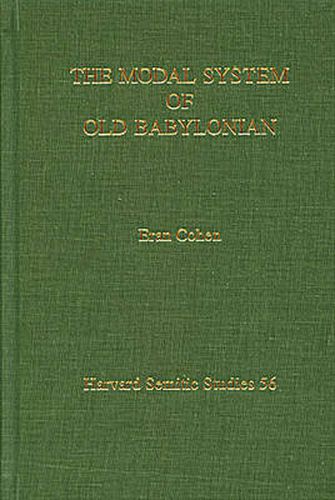Readings Newsletter
Become a Readings Member to make your shopping experience even easier.
Sign in or sign up for free!
You’re not far away from qualifying for FREE standard shipping within Australia
You’ve qualified for FREE standard shipping within Australia
The cart is loading…






This monograph is a corpus-based description of the modal system of epistolary Old Babylonian, one of the best attested Akkadian dialects, using the European structural method. The study strives to match a concrete exponent (i.e., an array of formal features, morphological and syntactic) with a semantic value, in using syntactic criteria. The book treats:
the asseverative paradigm (used for insistence, concession and oath), explaining the syntactic mechanism behind these forms;
the various precative-based paradigms in various syntactic conditions: the directive group, the wish group and the interrogative group;
the same forms occurring in special syntactic patterns-the sequential precative and the concessive-conditional precative;
the paratactic conditional; and
the modal nominal syntagm sa para:sim.
Together with this description, some additional problems are addressed for which solutions are developed: the focus system of Old Babylonian; the general linguistic issue of emphatic assertion (using an English corpus); and a way to describe the syntactic nature of paratactic conditional structures.
$9.00 standard shipping within Australia
FREE standard shipping within Australia for orders over $100.00
Express & International shipping calculated at checkout
This monograph is a corpus-based description of the modal system of epistolary Old Babylonian, one of the best attested Akkadian dialects, using the European structural method. The study strives to match a concrete exponent (i.e., an array of formal features, morphological and syntactic) with a semantic value, in using syntactic criteria. The book treats:
the asseverative paradigm (used for insistence, concession and oath), explaining the syntactic mechanism behind these forms;
the various precative-based paradigms in various syntactic conditions: the directive group, the wish group and the interrogative group;
the same forms occurring in special syntactic patterns-the sequential precative and the concessive-conditional precative;
the paratactic conditional; and
the modal nominal syntagm sa para:sim.
Together with this description, some additional problems are addressed for which solutions are developed: the focus system of Old Babylonian; the general linguistic issue of emphatic assertion (using an English corpus); and a way to describe the syntactic nature of paratactic conditional structures.